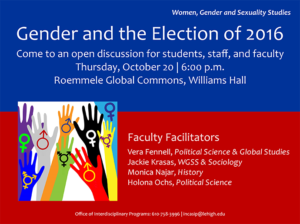
(Courtesy of Jackie Krasas)
A group of students, faculty and staff gathered in Williams Hall on Oct. 20 to discuss the implications of gender in the upcoming election.
This election marks the first time a female candidate, Democrat Hillary Clinton, has been elected the presidential nominee of a major U.S. political party.
The discussion was facilitated by four Lehigh professors; Vera Fennell, a professor of political science and global studies; Jackie Krasas, a professor of women, gender, sex and sexuality and sociology; Monica Najar, a professor of history; and Holona Ochs, a professor of political science. The audience was primarily comprised of female students.
“(The facilitators) just thought it was very odd that there was so little focus on gender in this election, so little focus on the historic nature of having a woman as president of the U.S.,” Fennell said.
She said such discussion is especially important because Republican nominee Donald Trump has expressed himself in a more patriarchal way.
Krasas said gender causes differences in voting patterns. She said the ways in which people understand and view candidates, the words used to describe candidates and the levity with which politicians view their own candidacies all have gender implications.
“I think there’s some really important dialogues happening about masculinity in this election,” Najar said.
Fennell said Trump is emphasizing his experience as a businessman and entrepreneur. Ochs said this has lead to a “vast majority” of men supporting Trump.
Ochs said she believes the idea of masculinity hurts both men and women. She said people choose not to follow women because they are automatically perceived as weaker and not suited for leadership. She said she identifies with Clinton because it is hard to respond to sexism.
Najar then asked the female students in the audience if they would ever consider running for president and received many negative responses.
Isabel Buenaga, ’17, is enrolled in a class taught by Ochs. She said she was “struck” by the title of the discussion and how it emphasized gender, not women. She said it’s important to have open conversations like these because they help make students more aware of the issues occurring in their daily lives.
Buenaga said both gender differences and inequality can be seen in every election, but they’re heightened in this one because Clinton is the first female candidate to make it this far in the presidential process.
Samantha Randall, ’18, is in a course taught by Najar. As a political science major and WGSS minor, she said the she found the topic of the discussion interesting and liked hearing various viewpoints on the issue.
Randall said she is “100 percent” a Clinton fan and she would love to see Clinton win. She said equality around women has been voiced more in this election, but not just because of Clinton. She said it also has to do with some of the things Trump voices.
Fennell said she wished the discussion focused more on the differences between Trump’s presentation of himself and his policies as well as Clinton’s struggle.
“(Clinton) has really been fighting in that second-wave feminist movement that I grew up in,” Fennell said.
She said Clinton represents one of the success stories of the feminist movement of the ’60s and ’70s that allowed her to find her own political career path and express her own values and beliefs. Fennell said Clinton would “break a glass ceiling” if she were elected president.
Fennell said the election represents an incredible milestone for American politics and for the country, but there must be more discussion to raise awareness of gender equality issues.





Comment policy
Comments posted to The Brown and White website are reviewed by a moderator before being approved. Incendiary speech or harassing language, including comments targeted at individuals, may be deemed unacceptable and not published. Spam and other soliciting will also be declined.
The Brown and White also reserves the right to not publish entirely anonymous comments.